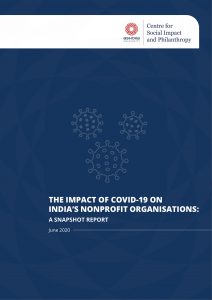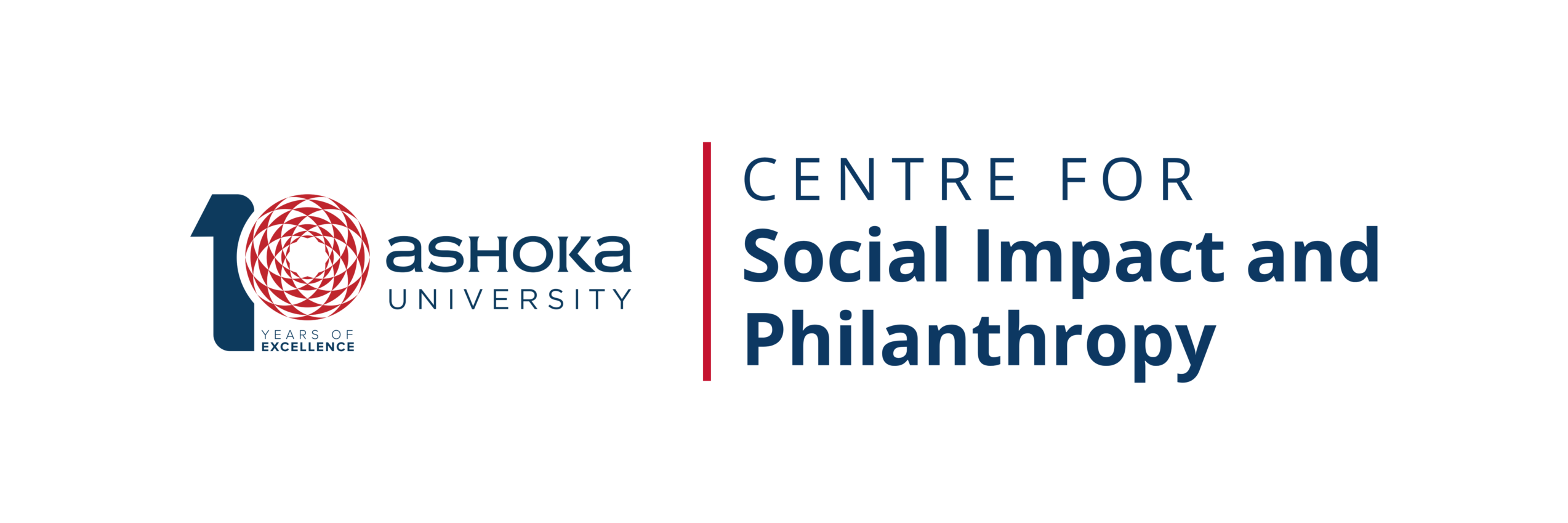Executive Summary: The Impact of COVID-19 on India’s Nonprofit Organisations


 This snapshot report presents a rapid response research project on the operational and financial implications of COVID-19 on nonprofit organisations (NPOs) in India. The Centre for Social Impact and Philanthropy conducted 52 interviews with nonprofit leaders in the months of April and May 2020, to assess their engagement in relief work, operational and financial status, and coping strategies during the pandemic.
This snapshot report presents a rapid response research project on the operational and financial implications of COVID-19 on nonprofit organisations (NPOs) in India. The Centre for Social Impact and Philanthropy conducted 52 interviews with nonprofit leaders in the months of April and May 2020, to assess their engagement in relief work, operational and financial status, and coping strategies during the pandemic.
We found that three-fourths of the NPOs are actively engaged in ongoing relief work, using their embeddedness in communities as a particular strength. This work ranges from last-mile delivery of relief material such as dry ration and sanitation kits, community awareness and sensitisation, setting up health camps and isolation facilities, rescuing stranded labour, provision of direct cash transfers, to offering rehabilitation of the distressed communities. While most of the surveyed NPOs have received additional funding specific to COVID-19, about a third have not received additional funding and are using their programmatic funding to finance relief work. NPOs raised concerns over increased costs of core operations during relief efforts, which are not adequately covered by the relief funding.
During the lockdown’s suspension of their regular on-the-ground programmes, some NPOs have shifted their focus to research and knowledge creation, building a social media presence and completing administrative tasks. The lockdown has made it evident to NPOs that their limited digital skills and capacities pose a major operational challenge. Realising the critical need for digital technology adoption in the post COVID-19 world, a few NPOs have started investing in digital skills.
We asked NPOs for how many months they can cover their fixed costs with funds they already have on hand. Of those that responded, 54 percent can cover fixed costs for
a year while 16 percent can cover costs for even longer. Worryingly, 30 percent can cover only six months or less. Organisations reported considering drastic measures including suspension of core programmes and trimming down team strength if funding is not forthcoming.
As most philanthropic funding is being channelled towards immediate relief work and healthcare needs, conversations with funders on core programmatic funding of these NPOs have stalled. NPOs are expecting considerable reductions in core programmatic funding in the near future, but are currently in a ‘wait and watch’ mode. This is in part because they are uncomfortable addressing fund-flow concerns to funders, and in part because it is only the first quarter of the fiscal year. Most are planning to take a stock of commitments and revisit funding and operational strategy in the coming quarter. CSIP will revisit these NPOs and others to reassess their situation as it becomes clearer.
While nearly all NPOs we spoke to have a diverse portfolio of funders, about half of them are dependent on CSR funding for most of their projects, a third depend primarily on international funders, and one-fifth of the NPOs receive most of their funding from Indian philanthropic foundations or high net-worth individuals. The NPOs dependent on CSR funding in particular are facing challenges. Corporate funders are redirecting a substantial part of current CSR funding to immediate relief work, including the PM CARES Fund. Furthermore, likely reduced financial profits will result in much smaller CSR budgets in the near future. NPOs dependent on Indian philanthropists cited long term commitment and passionate engagement with grassroots issues as the strongest virtue of Indian philanthropists, but noted that bureaucratic structures and slow approval processes are bottlenecks. NPOs with primary dependence on international funders reported receiving great support including proactive engagement with NPOs and offering a flexible approach to funding. However, nonprofit organisations worry that funding from international funders may reduce in future in light of the global impact of the pandemic.
NPOs shared their concern that the heightened focus on funding immediate relief work and healthcare interventions may diminish the urgency of addressing the socio- economic crisis which is likely to have long-term social implications. It is imperative for all stakeholders, NPOs, funders and ecosystem stakeholders to start considering the journey to recovery in the mid-term, and building resilience in the long-term.
Good Practices for NPOs
- Communicate with funders on current requirements and implications for the medium and long-term.
- Use social media to build and strengthen the narrative of the positive impact of NPOs on society, and to connect with funders and partners.
- Diversify funding sources and seek long-term support to reduce the risks that come with short-term, project-based funding.
- Prepare and plan for a post-COVID-19 world, including creating updated strategies and operational priorities in line with this new reality.
- Embrace technology and join the digital revolution to enable remote work and digitising of service delivery without excluding marginalised communities.
- Strengthen networks of nonprofit leaders to leverage partnerships and build a cohesive voice to advocate for appropriate and effective support from government, CSR, foundations and individual funders.
Implications for Funders
- Encourage your partner NPOs to speak freely and be transparent about available funding and priorities.
- Embrace flexible funding to help NPOs traverse current challenges. NPOs can use flexible funds as working capital, for capacity building, to rebuild their regular work, and to build resilience in the longer term. New approaches to accountability will be needed.
- Extend timelines and commitments, and adjust expectations, given the disruption in operations, and work with NPOs to revisit programme strategy and priorities.
- Invest in digital capacity and infrastructure. Funders and ecosystem stakeholders should invest in building capacity and in adequate digital infrastructure; and co-create new ways of digitally delivering programmes without excluding marginalised communities.
- Increase investment in, and attention to, livelihoods creation and re-skilling at the grassroots level. With millions of former migrant labourers back in villages, new livelihood opportunities need to be created and economies of low-income communities rebuilt.
- Provide non-programmatic core institutional funding. Many NPOs struggle to cover their overhead expenses, which may not be covered by programmatic grants and relief-work donations. Funders should consider ways to support these requisite administrative needs.
- Strengthen NPOs capacity to raise resources. Beyond funding programmes, donors should actively support NPOs to build their fundraising, communications and campaigning capacities.
- Create a collaborative emergency corpus of Indian philanthropists that can offer blended finance options to support immediate disaster relief, post-disaster recovery, and building resilience in the long-term.
- Continue to support regular programmes. Though the COVID-19 crisis has demanded an ‘all-hands-on deck’ approach, it is critical to be mindful of the social problems that persist and may worsen during the crisis.
- Encourage NPOs to build stronger, more agile and responsive networks to ensure the sector can shape the policies that affect it and the constituencies it serves. The philanthropy ecosystem should offer financial and non-financial support for such sector bodies.


